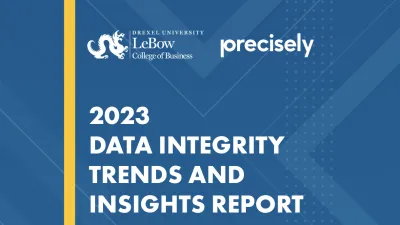New Study Finds Data Governance Programs Are Critical to Trusting Data for Confident Decision-Making
The LeBow College of Business’ Center for Business Analytics recently released findings from their new data management survey, created in collaboration with Precisely, the global leader in data integrity. The “Data Professionals Speak: Trends in Data Governance and Data Quality Programs” report provides insights into the potential rewards available to organizations starting to build data governance programs. The report found that 66% of data and analytics professionals experienced improved data quality as a “leading benefit” when implementing data governance programs, a trend that rises to a staggering 83% for organizations that already have a mature data governance framework in place. With 75% of respondents also acknowledging that data quality is their organization’s “top concern,” the report delivers a compelling message for businesses looking to better understand and trust their data.

New research from LeBow’s Center for Business Analytics, in collaboration with data integrity company Precisely, shows how data governance programs have a direct impact on data quality.
The findings show that organizations already investing in data governance are realizing significant added value from their data programs. Alongside improved data quality, respondents reported an overall “higher quality of data analytics and insights” (56%), as well as other benefits relating to “facilitated collaboration” (52%) and “faster access to relevant data” (50%).
Furthermore, the existence of a data governance program seems to encourage the adoption of more rigorous processes for data quality measurement. Fifty-four percent of organizations with data governance frameworks already deployed report that they have mechanisms in place to measure the quality of their data, compared to just 34% of organizations who don’t already have a data governance program implemented. With one in three of the overall respondents admitting that they “don’t currently measure the quality of their data,” the implementation of a data governance strategy could provide a real opportunity for those seeking to better understand their data — while also improving the measurement of key business metrics.
However, the report also shows that despite data governance programs receiving strong executive support, there is a very real challenge with overall organizational awareness and adoption — with 63% of respondents citing this as their primary obstacle to success. The findings uncover an appetite from businesses to better support adoption with enhanced training programs, with 51% of respondents reporting that some form of training is already place, 26% confirming that a formal program is being planned and 23% admitting that no training program has been developed at all.
“Data quality and data governance, key pieces of data integrity, work together to enable businesses to understand and trust their data for confident decision-making,” said Emily Washington, senior vice president of product management at Precisely. “This report with LeBow uncovers how data governance strengthens data quality. It also provides fascinating insight into the choices that organizations are making today and assesses which ones are the most effective in charting a path to data governance maturity and, ultimately, to achieving data integrity.”
The findings are based on a survey of 825 data and analytics professionals conducted between June and July 2021. Their functional titles included: C-level executives, line-of-business managers, IT executives, data stewards, data architects, data managers and data analysts.



